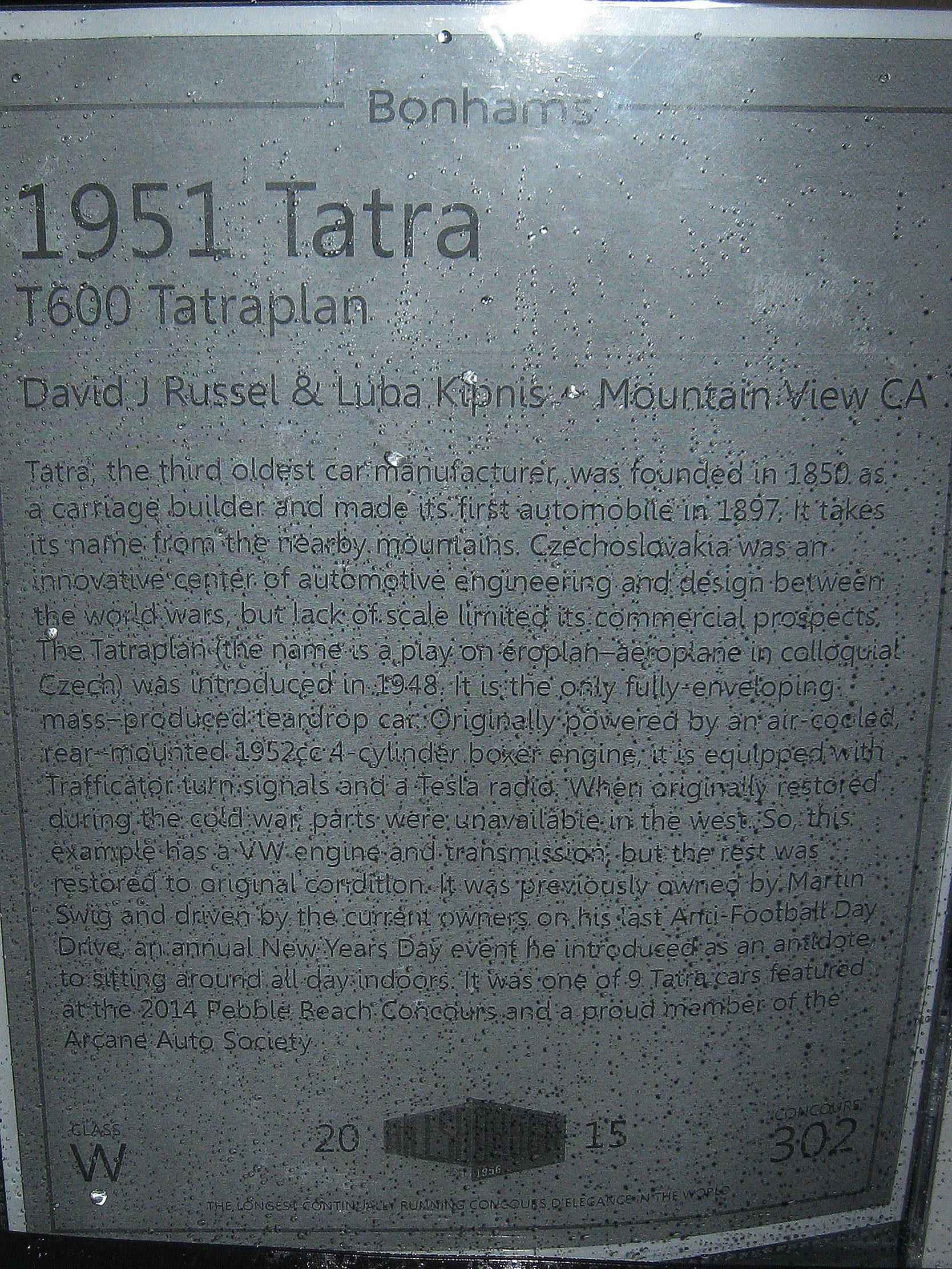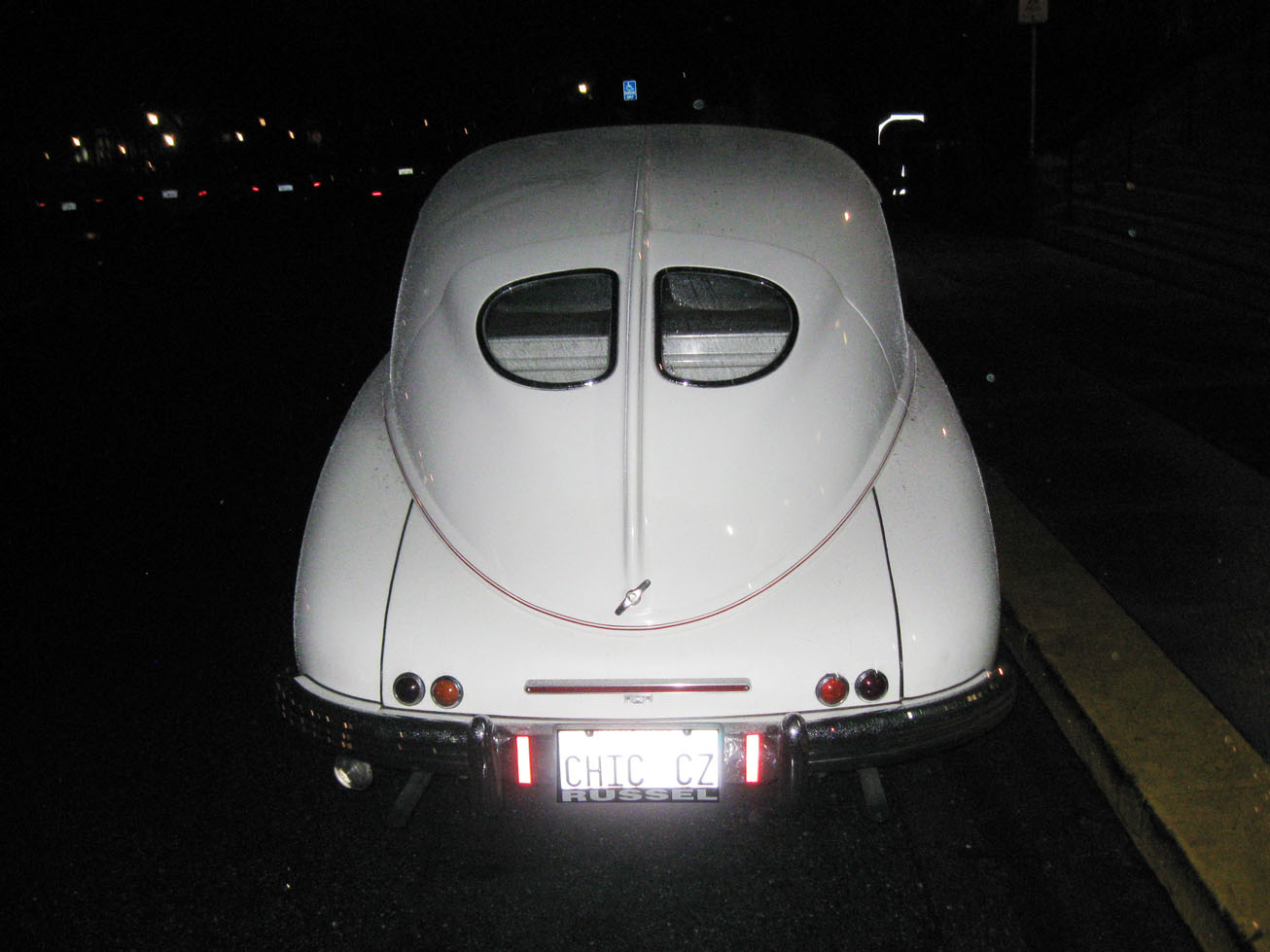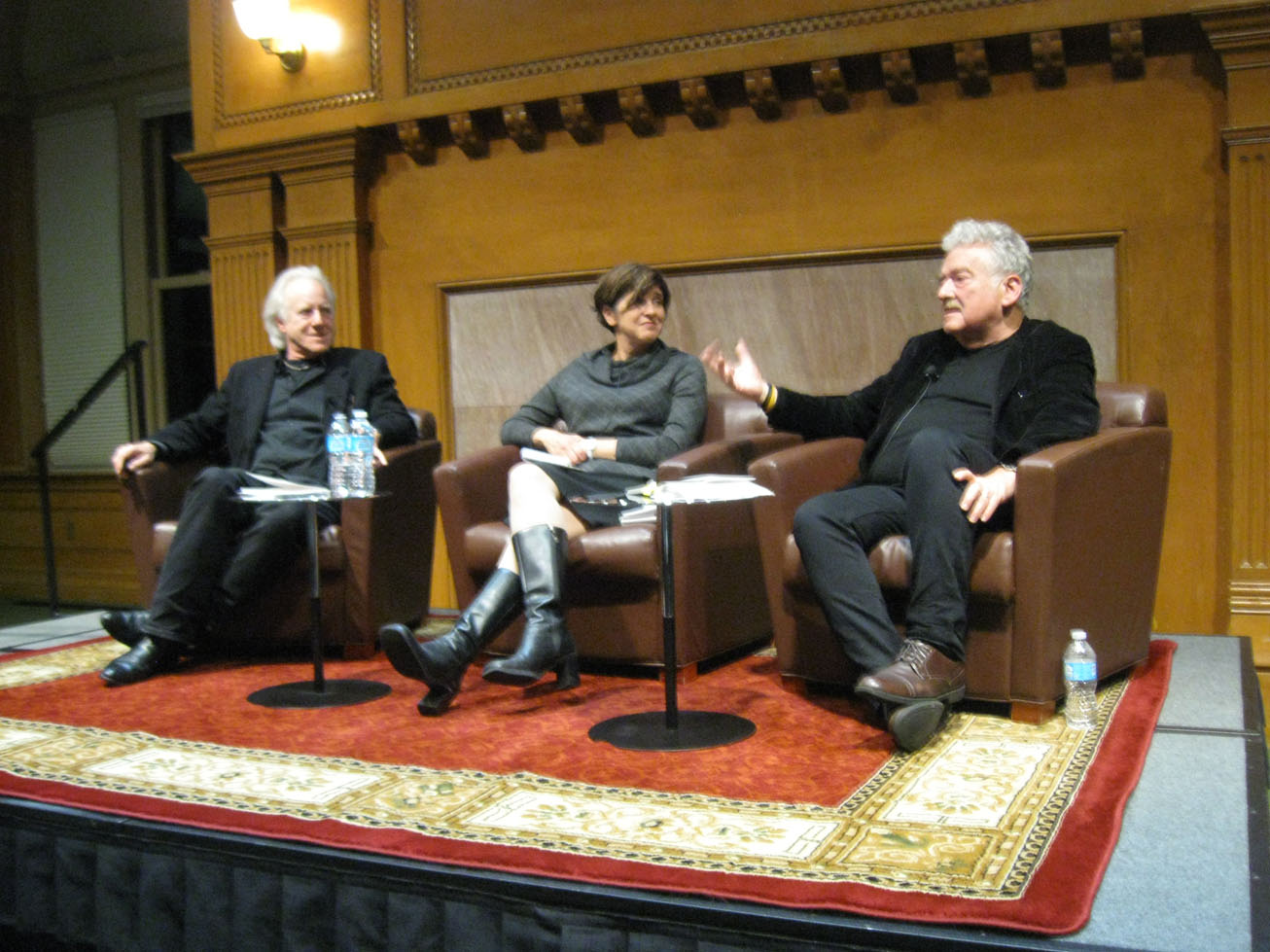.jpg) Too Loud A Solitude (1976) translated to English (1990) |
Another Look: Stanford Book Discussion Bohumil Hrabal: Too Loud A Solitude (1976) Discussants: Professor Robert Harrison (Stanford), Professor Hans Ulrich Gumbrecht (Stanford), Professor Karen Feldman (UC Berkeley) Bechtel Conference Center, Stanford Encina Hall Monday, February 6, 2017, 7:30-9:10 pm By Peter Y. Chou WisdomPortal.com |
T.jpg) Bohumil Hrabal (1914-1997) in wisdom mudra pose |
| Preface: Stanford Book Discussion Club Another Look is organized by Cynthia Haven since 2012. On February 6, 2017, 7:30 pm, book lovers came to Stanford Encina Hall's Bechtel Conference Center, to discuss the novella Too Loud A Solitude (1976) by Bohumil Hrabal, considered the greatest Czech writer in the 20th century. Professor Robert Pogue Harrison, Moderator of Another Look invited Stanford Professor Hans Ulrich Gumbrecht and UC Berkeley Professor Karen Feldman to join him as Discussants. Faith Bell of Bell's Books sent Peter Orner's essay to Another Look members— "Night Train to Split" (11-8-2016): "The first time I finished Too Loud a Solitude, I was up in Letná Park, and I remember leaping off the bench and running around in circles, holding the book above my head and shouting because I believed I'd experienced some religious illumination." Cynthia Haven's Feb. 3 email informed us that Another Look fan David Russel from Stanford's Radiology Department is bringing his 1951 Czechoslovakian car, a Tatraplan, also known as the T600. He'll park it outside Encina Hall, beginning at 6:30 pm. Despite the rain, he brought his vintage Czech auto to share with us. I had to use Photoshop to brighten the 7 photos of 1951 Tatra automobile and the info placards on the car. Hrabal's Too Loud A Solitude was not available at Foothill Library. The only copy in the Santa Clara Libraries system was at Saratoga Library due February 25 with 9 holds on it. The book was sold out at Stanford Bookstore. My friend didn't have time to go to Bell's Books to buy a copy. Just learned that Cynthia Haven also took Professor Freccero's "Dante's Divine Comedy" Stanford class (Spring 1991) with me. She was so generous to lend her copy of the book, so we could follow the Discussants reference to page numbers during their comments. She told us to bring her book back in May when Another Look meets again to discuss Dostoyevsky's The Double. Below are my Notes of the Discussants and the audience. |
.jpg) Another Look flyer for Too Loud A Solitude |
T.jpg) 1951 Tatra at Stanford Theatre Photo by David Russell (8/2015) |
 1951 Tatra Auto Info Sheet courtesy: David Russell |
 1951 Tatra T600 Info Sheet courtesy: David Russelll |
.jpg) Bechtel Center, Stanford Encina Hall Meeting Place for Another Look |
 Front of 1951 Tatra Auto Parked in Front of Encina Hall |
 Back of 1951 Tatra Auto Parked in Front of Encina Hall |
 Left Side of 1951 Tatra Parked in Front of Encina Hall |
 Right Side of 1951 Tatra Parked in Front of Encina Hall |
 Another Look Discussants: Harrison, Feldman, Gumbrecht |
|
p. x: Grace is something that comes to us when we somehow find ourselves
completely available, when we become open-hearted and open-minded, and are willing
to entertain the possibility that we may not know what we think we know. In this gap of not knowing, in the suspension of any conclusion, a whole other element of life and reality can rush in. This is what I call grace. It's that moment of "ah-ha!"— a moment of recognition when we realize something that previously we never could quite imagine.
p. 2: What I realized was that adults spent a lot of time thinking, and
more important than that— and more odd,
p. 4: I wondered, "Why is it that human beings have such a difficult time putting
their suffering down?
p. 5: It took me many years, probably a good couple of decades,
to realize that what I'd seen as a child struck
pp. 6-7: The great spiritual teacher Krishnamurti once said, "When you
teach a child that a bird is name 'bird',
p. 8: This is the dream world that is addressed by many ancient
spiritual teachings. When many of the old saints and sages say, "Your
world is a dream. You're living in an illusion", they're referring to this
world of the mind
p. 9: To begin with, we have to make a simple, yet very powerful
observation: All thoughts— good thoughts,
p. 11: There was a saying attributed to Jesus in The Gospel of Thomas,
written shortly after Jesus's death,
p. 12: This is one of the laws of the universe: that everything you see,
taste, touch, and feel will eventually disappear back into the source from which
it came, only to be reborn and appear yet again, receding again
pp. 14-15: This is why Jesus said that when you begin to find, you will be
disturbed... Are you willing to be aware? Are you willing to open your eyes? Are you
willing to be wrong? Are you willing to see that you may pp. 16-17: When I look underneath the veil of thinking, what I find is that I am a mystery. In some ways, I disappear. I disappear as a thought. I disappear as an imagined someone. What I find, if I'm anything at all, is that I'm a point of awareness, recognizing that everything I think about myself isn't really what I am: I recognize that the next thought I have could never truly describe me... And isn't it obvious that if we don't go to our minds, that what we are is something spacious and of amazing mystery, amazing wonder, that we are a still quiet point of awareness and consciousness? p. 18: Because you longer want to suffer. Because you're willing to be disturbed. You're willing to be amazed. You're willing to be surprised. You're willing to realize that maybe everything you've ever thought about yourself really isn't true. p. 20: But if we're beginning to look at the core and the root of suffering, we start to see that an image is just that: It's an image. It's an idea. A set of thoughts. It's literally a product of imagination, It's who we imagine ourselves to be... we remain in a continuous state of protecting or improving our image in order to control how others see us. p. 22: If we think we're good and worthy, we'll create good and worthy emotions. But if we think we're unworthy, then we'll create negative emotions. So we can have a good or bad self-image, a self-image that feels emotionally either better or worse, but no matter what it is, if we look deeply at the core of all our images, there is this feeling of not being authentic, not being real.
|
|
Notes for Another Look Book Discussion (February 6, 2017): Too Loud A Solitude (1976) by Bohumil Hrabal Stanford Professor Robert Pogue Harrison, Moderator of Another Look
Stanford Professor Hans Ulrich Gumbrecht
UC Berkeley Associate Professor Karen Feldman
Robert Harrison:
Any attempt to offer interpretation will not work.
But the book is about something. I believe the book is allegorical.
Hans Gumbrecht:
Priest in Gabriel Márquez's
One Hundred Years of Solitude (1967)
levitates when he drinks a type of chocolate.
Karen Feldman:
This book is about compressing and compacting. Not form of stream of consciousness.
There is a concreteness to it. Robert Harrison: One reason this book was chosen for discussion is that it speaks to our own time. Fate of the book is in doubt. Reductionism, dogma in the sciences. Human behavior is interpreted as material base. Our culture needs a lot of Hantas to the rescue.
Hans Gumbrecht:
I go to Stanford Green Library to my carrel, and the surrounding book shelves
are empty. The hard copies Questions & Answers with Audience: Questioner: I was in Czechoslovakia in 1990 and could relate to what Hrabal described in this book. Hans Gumbrecht: The flavor of Hrabal's book is cultural legacy.
Questioner: This was a sad book to read. Hanta was destroying books
and creating bales of compacted books. He takes some Karen Feldman: She tells of episode on slaughtering chickens that become middle of bale of compacted books.
Hans Gumbrecht:
Transubtantialation—
[Catholic Church teaching: change of substance by which the bread and the wine offered
Robert Harrison:
Incorporate— to be transsubataniated. Go to Greece and talk
about Aristotle and Plato. Questioner: I'm wondering about Hrabal's book title Too Loud a Solitude— Page 53: "I felt beautiful and holy" Karen Feldman: Title is not overarching. It's one choice among others.
Hans Gumbrecht:
It's a "B+" title. This book's content is much better than its title.
Questioner:
On Page 1— "I sip it like a liquer until the thought dissolves in me like alcohol"
Robert Harrison:
Liquer until it dissolves into the blood vessel.
The Socialist Brigade drinks milk. Baseball cap worn is Hans Gumbrecht: Yellow was used by the Nazis to mark Jews in concentration camps. Robert Harrison: No one talked about Hanta's mother. What happened to the missing "ounce and half" when she died? Questioner: Weight of the soul. (Poem: "Soul Weight" 3/4 ounce)
Questioner:
The author is a lover of literature. But he portrays
Hanta as grotesque. He's an anti-hero.
Karen Feldman:
Resistance— He doesn't wash himself. Now and then, he washes his neck and his wrist. Robert Harrison: It's tragic that he destroys books. The Socialist Brigade will not rescue books. Hans Gumbrecht: Two modalities— Robert Harrison: He'll keep company with the books.
Hans Gumbrecht:
I've not read many books on my bookshelves. The Stanford University Press gave me
Robert Harrison:
Our next Another Look book discussion in May
will be about an author that's well known— |
| Top of Page
| J.A. Baker's The Peregrine
| Birds Killed by Peregrine
| Hans Peeters' "Discovering Raptors" |
| Werner Herzog's Of Walking In Ice
| Stanford's Another Look
| J.L. Carr's A Month in the Country |
| Top of Page
| End of Your World
| Poems 2016
| Haikus 2017
| Viktor Frankl
| Enlightenment Changes Brain |
| Haikus 2017
| Haikus 2016
| Haikus 2015
| Haikus 2014
| Haikus 2013
| Haikus 2012
| Haikus 2011 |
| Poems 2017
| Poems 2016
| Poems 2015
| Poems 2014
| Poems 2013
| Poems 2012
| Poems 2011 |
| Poems Index
| CPITS
| Poetry & Power
| Interesting News
| Books
| A-Z Portals
| Home |
| © Peter Y. Chou,
Wisdom Portal P.O. Box 390707, Mountain View, CA 94039 email:  (5-13-2017) (5-13-2017) |
|
.jpg)
.jpg)
.jpg)